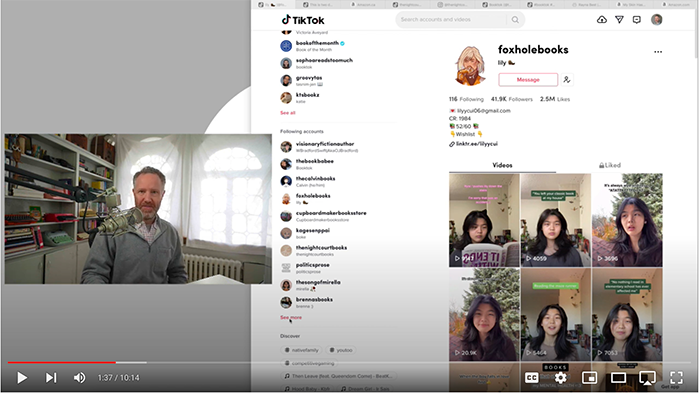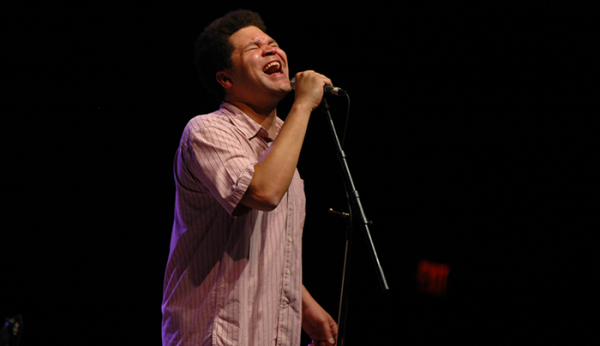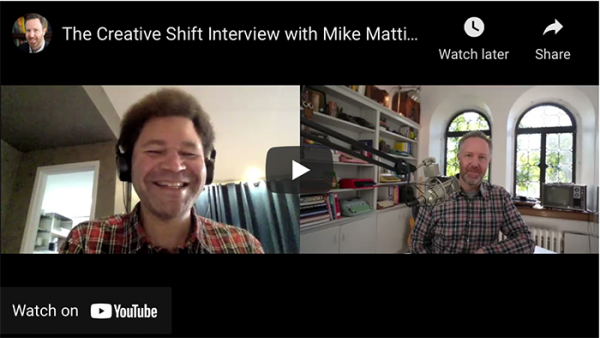I talk to a lot of writers and artists who want to grow their platform. They want to feel that they are effectively sharing their creative work, that they know how to reach their ideal readers, and in the process, grow their footprint in the marketplace. They struggle many creators feel is that there is an unending list of tasks they have to do if they want to market their work. They are inundated with tips and ideas that they find online.
But sometimes if you want to grow your platform, less is more.
I would rather see you focus deeply on one channel or one theme, than try to “do it all.” Meaning, you don’t have to be super active on 4 social networks and have a blog and newsletter and podcast and do webinars and such. I have found that doing less can be more effective. Let’s explore why.
Focus on fewer channels, but go deeper.
Imagine if all your marketing energy went into just email. Writing the best newsletter possible. Turning it into more of a community. Focusing people’s attention only to that place. In the process, forging powerful connections that not only grows your network, but lays the groundwork for word-of-mouth marketing for your writing or creative work.
Compare that to juggling a mixed bag of other tasks: Tweeting here, posting to Instagram there, sending out a newsletter every so often, and so on. What if you doubled down on one thing that resonated deeply with you, and would create the best possible experience for your ideal audience?
Whenever I find an example of someone who does something really well, let’s say they have a huge Instagram following, I often find that their other channels are barely updated. Meaning: they are optimizing for one channel, and one community. Last week I did a deep dive into people on TikTok who share videos about books, and noticed for some of them, they would have tens of thousands of followers on TikTok, and maybe 200 on Twitter.
This can align to the business strategy for a creator as well. I was recently working with a client who, in addition to her writing, also offers services and sells products. In developing a marketing strategy, we were considering the idea of honing her products and services down to just one offering. This would focus her own creative energy into the thing she loves most, and would also focus her audience’s attention there as well. Each day, she would be optimizing for the joy she feels in that process, and the ways her work can help transform the lives of her ideal readers.
Creative energy is precious. Use it wisely.
You have a limited amount of creative energy each day. If you are a writer or artist, a bulk of that energy should be used for your craft. To develop one’s platform and marketing, that can require creative energy as well. It can be more powerful to put that remaining energy into one place – one channel or strategy – than to split it into dozens of other “best practices” that diffuses your time and attention. Why? Because so much of what is happening when you are learning a new platform is to develop a literacy of it. So if I am working with a writer to build their presence on Instagram, consider all the things they are learning:
- How to use the Instagram main feed
- How to use Instagram Stories
- How to use Instagram Reels
- How to take good photos
- What hashtags they prefer
- What content feels right for them to share
- What their writing style and voice will be like on this platform
- Who to follow
- How to engage
- … and so much else.
Now if we add Twitter, the amount you are learning needs to double. Then a newsletter, it doubles again. It’s a lot to take in, it can feel overwhelming, and result in you doing the bare minimum, yet still feeling like you are stretched too thin.
Of course, many of the writers and creators I work with have a presence across many channels online, and I do that myself. But worth noting is that this happened slowly over time. I was active on Twitter for years before I really started sharing much on Facebook. Then another couple years until I started sharing on Instagram. I was sending out a newsletter for 5 years before I started a podcast. That gives me a lot of time to develop a literacy of each channel, the community within each, and develop my own voice and messaging.
When you focus on one place, you can focus your energy on how to create the experience that feels most authentic to you, and gives others the emotional experience that aligns to what you create and why. What do you want people to feel when they follow you? When you focus that energy, you can create a more dynamic experience.
Frequency matters.
When you put more creative energy into one place, that means you are able to show up there more often. For developing an audience online, posting frequently is usually essential. I am constantly studying those who are successfully finding an audience online, and again and again I see that these people show up every single day. Earlier this week I was working with a client, and we were discussing how another author had developed such a big following on Instagram. Sure enough, when we looked at that person’s account we saw they had shared more than two dozen updates in their Instagram Stories in the last 24 hours. This person was showing up in the lives of her readers in a big way, and clearly, they love it!
Do you need to do exactly that? Nope. You will find your own path. I simply share that to illustrate the point that when you show up, it creates more chances for engagement. When I was in college, I worked in food service. I remember someone walking in once, saying, “I’ll have my usual.” They were offended when I asked, “What is that?” That person would go on to say something like, “Hey! I’m a regular! I’m in here every week! You should know what I want.” But the reality was that we had customers who came in twice a day, every day. So for each time that person who came in once a week ordered something, a true “regular” had already been in 13 additional times. That’s 13 other times I would hear their order, have an interaction, and develop rapport.
If your strategy for developing an author platform is to do the bare minimum, you may find growth to be frustratingly slow for this same reason. This applies to so much of what it means to go from a hobbyist to a professional with one’s creative work. For instance, a writer recently told me that they don’t have a network at all in the writing world, but it was their dream to ensure their writing finds an audience. So I began creating a program for them to develop that network in a consistent and meaningful manner. One aspect of that may be for them to send out emails to like-minded creators thanking them for their work. So if they send one email a week, that means they will send 52 a year. Which is nice. That would lay a solid foundation. But… what if they did it daily? That would be 365 emails a year, exponentially more. Is it more work? Yes! Way more work. But if you focus intensely on one thing, growth becomes exponential. It would take 7 years to send those 365 emails at the pace of one a week, compared to one year if they sent daily.
Boundaries are required for great art. Also for great marketing.
Focusing on less can hone your creative energy and the attention of your audience. This is a concept I have been thinking about in so many ways, including the craft of creative work.
In 2017, I set out to finally learn how to play guitar properly. For a quarter century, I had dabbled, picking it up every now and again, learning the same few chords, then letting it languish for years at a time. So in 2017, I began practicing every single day for a year, and then continued that. I found an extra hour a day to create along the way. Awhile later, I felt stuck in my guitar practice, so I hired a coach to get unstuck. Then in 2020 as the pandemic set in, I had to find new ways to motivate myself.
After four years, and all of this work, my goals with guitar still feel elusive. You see, there are soooooooo many amazing guitar tutorials online. What I found was that I kept accruing knowledge, but not the experience I hoped for with guitar. I had all of these disaparate pieces, but nothing tying them together.
So I hired a guitar coach again, the same one I used a couple years back. His name is Mark, and he lives in New Zealand. But this time, I was radically clear about how I hoped to focus our work together. My goal is simple: I don’t want knowledge, I want to be able to pick up an acoustic guitar, sit on my porch, and play a certain style of music for 30-60 minutes. That’s it.
We talked about what I wanted to play, which is key to ensuring I made progress. In considering this, I realized I had been focusing on too many of the wrong things as I learned guitar the past few years. So many guitar lessons I dove into had focused on a genre of music I appreciate, but don’t love, or they taught me to simply mimic famous songs. But that wasn’t my goal. I told Mark about how much I love the work of Will Ackerman and the solo guitarists from the Windham Hill record label in the 1980s and beyond. I had the privilege of interviewing Will a couple years back.
Mark immediately got it and began playing some compositions, asking, “You mean, like this?” My reaction: “YES!!!! THAT! That is what I want to be able to do!”
He replied that is his favorite way of playing when he is alone, and he began creating a program for me to follow. The key ingredient in it is limits. Strictly limiting what I focus on in order to develop this competency. For now, we are only working within one key, and in one finger position on the fretboard. The truth is none of the knowledge he is sharing is anything I didn’t already know. But he is helping me string it all together in a way that I never had before. The results are amazing so far.
Here we are, slowing down, and focusing on one thing. It is all about appreciating the limits, and making incremental but meaningful progress. I am finding that small changes lead to huge results.
If you are hoping to establish or grow your platform, I want to encourage you to do less. To focus your energy on just one or two things that matter most to you.
Thanks!
-Dan



